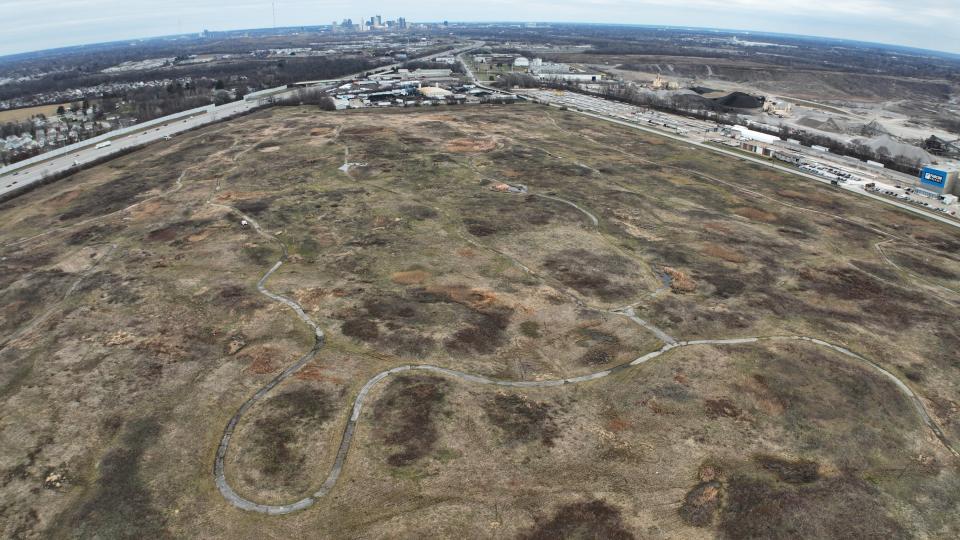Lights out: Columbus solar farm project on landfill dies before construction began
The Solid Waste Authority of Central Ohio has cancelled a $70 million project to create a 50-megawatt solar-panel farm that could have supplied electricity to about 5,000 Columbus homes.
That means another of the planned sources for the city's municipal green-energy aggregation program, whose power is being supplied by AEP, has been scrapped, further delaying the city's pledge to supply 100% of the program's power needs with locally generated green power.

On Thursday, SWACO sent a registered letter to the solar-park developer, BQ Energy Development, LLC., stating that a ground lease would be allowed to automatically terminate "as a result of (the firm) not commencing operations within the required time."
"While disappointed that the project was not able to achieve our redevelopment and renewable energy goals for the site, SWACO remains committed to developing the closed landfill into a solar array and will be exploring options available to us in order to achieve our vision for the site and generate green energy for the benefit of Franklin County families and businesses," Hanna Greer-Brown, a SWACO spokesperson, said in an email.
BQ Energy, the Wappingers Falls, New York-based solar-farm developer specializing in building atop landfill and brownfield sites, didn't return telephone messages with its office.
In a much-publicized deal in 2020, SWACO agreed to lease BQ Energy 173 acres of the closed landfill northeast of the interchange of I-71 and I-270 on the South Side for 25 years. This was expected to generate about $12 million in projected rental fees for the agency. SWACO began managing the landfill in 1987, and the site was repurposed as Phoenix Links Golf Course in 2000. But the golf course closed in 2015 due to no firms wanting to operate it.
While the solar farm was initially projected to be generating electricity by 2022, SWACO gave BQ until last summer to complete construction. The project was granted a one-year extension last year, Greer-Brown said.
"This public-private partnership benefits the entire community and sends a powerful message about central Ohio," Ty Marsh, the former SWACO executive director, said in a Dispatch opinion essay in July 2020. "... (It) will reinforce our community's commitment to and advancement of sustainability and serve as a reminder that Columbus is a smart city using ingenuity to enhance our quality of life."
The cancellation of the elevated landfill project comes as the city's municipal electric aggregation program, which supplies over 200,000 Columbus residential and small-business customers, is struggling to keep up with initial green commitments.
At a December City Council meeting, the Columbus Public Utilities Department revealed that the aggregation program's massive $1 billion building commitment announced in 2020 by supplier AEP Energy, a subsidiary of Columbus-based utility AEP, was behind schedule due to inflation and supply-chain issues.
None of the pledged locally sourced wind and solar facilities were yet up and running. The company revised downward the goal of 100% local green generation by 2022 to a goal providing 60% by 2034, the last year of the original contract, along with higher prices in a renegotiated contract.
City officials currently are projecting some local generation will be up and running for aggregation customers soon.
"We’re delivering on the promise to provide local, Ohio-based clean energy to power our homes and small businesses," Mayor Andrew Ginther said in September 2021 in announcing a deal for the city to purchase power from the SWACO solar farm for its own public utility, the 16,000-customer Columbus Division of Power. "This project will serve as a beacon in our community, signaling our steadfast commitment to a healthy and prosperous future for all residents.”
“We remain committed to the development of a solar park on SWACO property and using that clean energy to support the Columbus community," Ginther spokesperson Melanie Crabill said in a Friday email. "... We will continue to work with our partners to determine the future development of the site and to our goal of providing 100% Ohio-based clean energy.”
While SWACO, too, remains committed to developing the closed landfill, it's in no talks with any developers, Greer-Brown said. BQ had been engaged in design and permitting work, and "shared with us is that increased interest rates, the price of equipment and labor dramatically impacted the project as originally envisioned," she said.
"A lot of factors out of the project’s partners control impacted this project. Most notably, rising costs made the current project’s financial model unfeasible," Greer-Brown said.
SWACO spent none of its money on the project, and collected a total of $40,000 from BQ in lease payments from 2020-2023, Greer-Brown added.
wbush@gannett.com
@ReporterBush
This article originally appeared on The Columbus Dispatch: Columbus Solar Park on landfill dies with lack of action by BQ Energy

